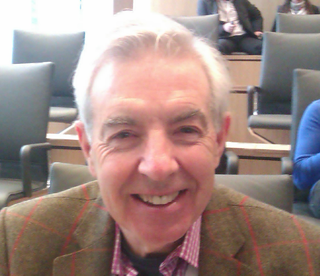
Antipsychotics, also known as neuroleptics, are a class of psychotropic medication primarily used to manage psychosis, principally in schizophrenia but also in a range of other psychotic disorders. They are also the mainstay together with mood stabilizers in the treatment of bipolar disorder.
Psychosis is a condition of the mind that results in difficulties determining what is real and what is not real. Symptoms may include delusions and hallucinations, among other features. Additional symptoms are incoherent speech and behavior that is inappropriate for a given situation. There may also be sleep problems, social withdrawal, lack of motivation, and difficulties carrying out daily activities. Psychosis can have serious adverse outcomes.

Schizophrenia is a mental disorder characterized by continuous or relapsing episodes of psychosis. Major symptoms include hallucinations, delusions and disorganized thinking. Other symptoms include social withdrawal and flat affect. Symptoms typically develop gradually, begin during young adulthood, and in many cases are never resolved. There is no objective diagnostic test; diagnosis is based on observed behavior, a psychiatric history that includes the person's reported experiences, and reports of others familiar with the person. For a diagnosis of schizophrenia, the described symptoms need to have been present for at least six months or one month. Many people with schizophrenia have other mental disorders, especially substance use disorders, depressive disorders, anxiety disorders and obsessive–compulsive disorder.

Clozapine is a psychiatric medication and is the first atypical antipsychotic to be discovered. It is primarily used to treat people with schizophrenia and schizoaffective disorder who have had an inadequate response to two other antipsychotics or who have been unable to tolerate other drugs due to extrapyramidal side effects. It is also used for the treatment of psychosis in Parkinson's disease.
The dopamine hypothesis of schizophrenia or the dopamine hypothesis of psychosis is a model that attributes the positive symptoms of schizophrenia to a disturbed and hyperactive dopaminergic signal transduction. The model draws evidence from the observation that a large number of antipsychotics have dopamine-receptor antagonistic effects. The theory, however, does not posit dopamine overabundance as a complete explanation for schizophrenia. Rather, the overactivation of D2 receptors, specifically, is one effect of the global chemical synaptic dysregulation observed in this disorder.
Anthony David FMedSci is a British neuropsychiatrist based at University College London. Previously tenured as professor of cognitive neuropsychiatry and Vice Dean at the Institute of Psychiatry, King's College London, since 2018 he has been Director, University College London, Institute of Mental Health. He is the father of Rebecca David, a Senior Campaign Manager at Influencer LTD and Michael David a junior doctor.

The Institute of Psychiatry, Psychology & Neuroscience (IoPPN) is a leading centre for mental health and neuroscience research, education and training in Europe. It is dedicated to understanding, preventing and treating mental illness, neurological conditions, and other conditions that affect the brain. The IoPPN is a faculty of King's College London, England, and was previously known as the Institute of Psychiatry (IoP).
Professor Christos Pantelis is an Australian professor of medicine who is the Director of the Melbourne Neuropsychiatry Centre.

Sir Robin MacGregor Murray FRS is a Scottish psychiatrist, Professor of Psychiatric Research at the Institute of Psychiatry, King's College London. He has treated patients with schizophrenia and bipolar illness referred to the National Psychosis Unit of the South London and Maudsley NHS Trust because they fail to respond to treatment, or cannot get appropriate treatment, locally; he sees patients privately if they are unable to obtain an NHS referral.
The management of schizophrenia usually involves many aspects including psychological, pharmacological, social, educational, and employment-related interventions directed to recovery, and reducing the impact of schizophrenia on quality of life, social functioning, and longevity.
Pierre Flor-Henry is a Canadian psychiatrist, researcher, lecturer, and professor. His most important initial contribution was the demonstration in the study of epileptic psychosis, that schizophrenia relates to left and manic-depressive states relate to right hemisphere epilepsies.

South London and Maudsley NHS Foundation Trust, also known as SLaM, is an NHS foundation trust based in London, England, which specialises in mental health. It comprises four psychiatric hospitals, the Ladywell Unit based at University Hospital Lewisham, and over 100 community sites and 300 clinical teams. SLaM forms part of the institutions that make up King's Health Partners, an academic health science centre.
Anissa Abi-Dargham is an American psychiatrist and researcher. She is a psychiatry professor and vice-chair of research at Stony Brook University and professor emerita at the Columbia University College of Physicians and Surgeons.

The National Psychosis Unit is a national treatment centre for patients with schizophrenia and other psychotic disorders, in the United Kingdom. The unit is a tertiary referral centre in the National Health Service. It is located at the Bethlem Royal Hospital, part of the South London and Maudsley NHS Foundation Trust. It is closely affiliated to the Institute of Psychiatry, King's College London, and forms part of the Psychosis Clinical Academic Group of King's Health Partners.
Sophia Frangou is a professor of psychiatry at the Icahn School of Medicine at Mount Sinai where she heads the Psychosis Research Program. She is a Fellow of the Royal College of Psychiatrists and vice-chair of the RCPsych Panamerican Division. She is a Fellow of the European Psychiatric Association (EPA) and of the American Psychiatric Association (APA). She served as vice-president for Research of the International Society for Bipolar Disorders from 2010 to 2014. She has also served on the Council of the British Association for Psychopharmacology. She is founding member of the EPA NeuroImaging section and founding chair of the Brain Imaging Network of the European College of Neuropsychopharmacology. She is one of the two Editors of European Psychiatry, the official Journal of the European Psychiatric Association.

Janet Treasure, OBE PhD FRCP FRCPsych, is a British psychiatrist, who specialises in research and treatment of eating disorders.
Anne Farmer is emeritus professor of psychiatric nosology at the Institute of Psychiatry and was formerly lead consultant in the Affective Disorders Unit at the South London and Maudsley NHS Foundation Trust and the trust's director of medical education. Farmer's focus is on genetic research in affective disorders. Farmer was previously professor of psychiatry at the University of Wales College of Medicine.

Philippa Garety is Professor of Clinical Psychology and Clinical Director of the Psychosis Clinical Academic Group (CAG), South London and Maudsley NHS Foundation Trust. Garety specializes in the psychological understanding and treatment of psychosis and, in particular, delusions.
Immuno-psychiatry, according to Pariante, is a discipline that studies the connection between the brain and the immune system. It differs from psychoneuroimmunology by postulating that behaviors and emotions are governed by peripheral immune mechanisms. Depression, for instance, is seen as malfunctioning of the immune system.

Paolo Fusar-Poli is an Italian and British medical doctor, psychiatrist, and Professor at the Institute of Psychiatry, Psychology and Neuroscience, King's College, London and at the Department of Brain and Behavioral Sciences, University of Pavia.










